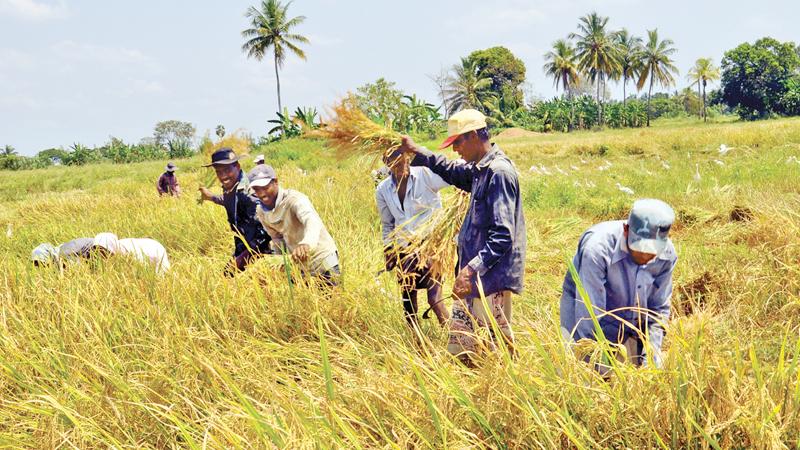
Sri Lanka needs 196,000 mt of rice per month for consumption and the challenge before the country is to increase production without resorting to rice imports, an authority on agricultural science, Professor, Weed Science and President, Weed Science Society of Sri Lanka (WSSSL), Prof. Buddhi Marambe said.
He said that the country’s food security was threatened and the situation could take a turn for the worse. The world is concerned about food security at present in a big way and it encompasses the properties of availability, access, affordability, quality, nutrition and safety, he said.
 “However, the Overarching Agriculture Policy developed with the assistance of the European Union for public consultations would help the country to manage the situation,” he said.
“However, the Overarching Agriculture Policy developed with the assistance of the European Union for public consultations would help the country to manage the situation,” he said.
Prof. Buddhi Marambe is also the Chairman, National Experts Committee on Climate Change Adaptation (NECCCA), Ministry of Environment and Chairman, National Invasive Species Specialist Group (NISSG), Ministry of Environment.
Technical Assistance to Modernisation of Agriculture Program (TAMAP) in Sri Lanka commissioned a short-term expert team to assist the government to improve its support to farmers, farmer organisations and the extension services. TAMAP supported the country in the development of an Overarching Agriculture Policy (OAP). With the adoption of the OAP it is expected that the entire agriculture sector in Sri Lanka will become more effective, efficient and competitive.
A large number of agriculture business models were assessed with a view to their applicability in the Sri Lankan context, established a ranking of preferred farmer business models for Sri Lanka as well as an inventory of the necessary resources and finally a roadmap to achieve the preferred structure.
“It is necessary to have in place a mechanism to minimise crop damage and waste.
To this end, the OAP will facilitate reduction in agriculture wastage. The crop losses during three Yala and Maha seasons in 2015, 2016 and 2017 had compelled the country to import rice. However, in 2018 the country had a bumper harvest, he noted.
The agriculture sector is experiencing 20 to 40 percent post harvest losses especially as regards to perishable products.
“We need to think in a novel way to overcome this problem which will have serious implications for food production and food security,” he said.
The policy had been developed over the past 10 months through wide stakeholder consultations at central and local level supported by the EU’s Technical Assistance to Modernisation of Agriculture project, he said.
The OAP was part of Sri Lanka’s strategic response to the evolving priorities and challenges in the global, national and sectoral environments. Prof. Marambe said.
The Green Climate Fund is expected to provide USD 100 billion every year from 2020 to tackle climate change issues. However, to-date only USD 10.2 billion had been committed. This is an area where the country should strongly focus on and take necessary action, he said.
There had been 4.8 percent growth in the agriculture production, in 2018, despite the challenging weather conditions, and technology adoption was at a higher rate in Sri Lanka and this was the secret of sustainable development, he noted.
“Food imports had become inevitable in the face of unfavourable weather conditions. There will be many challenges in the agriculture sector within the next 10 years and one key challenge is people’s changing food habits.
This has resulted in an increasing demand for grains which in turn has increased human consumption. The demand for animal feed also has increased over the years.” Prof. Marambe said.
